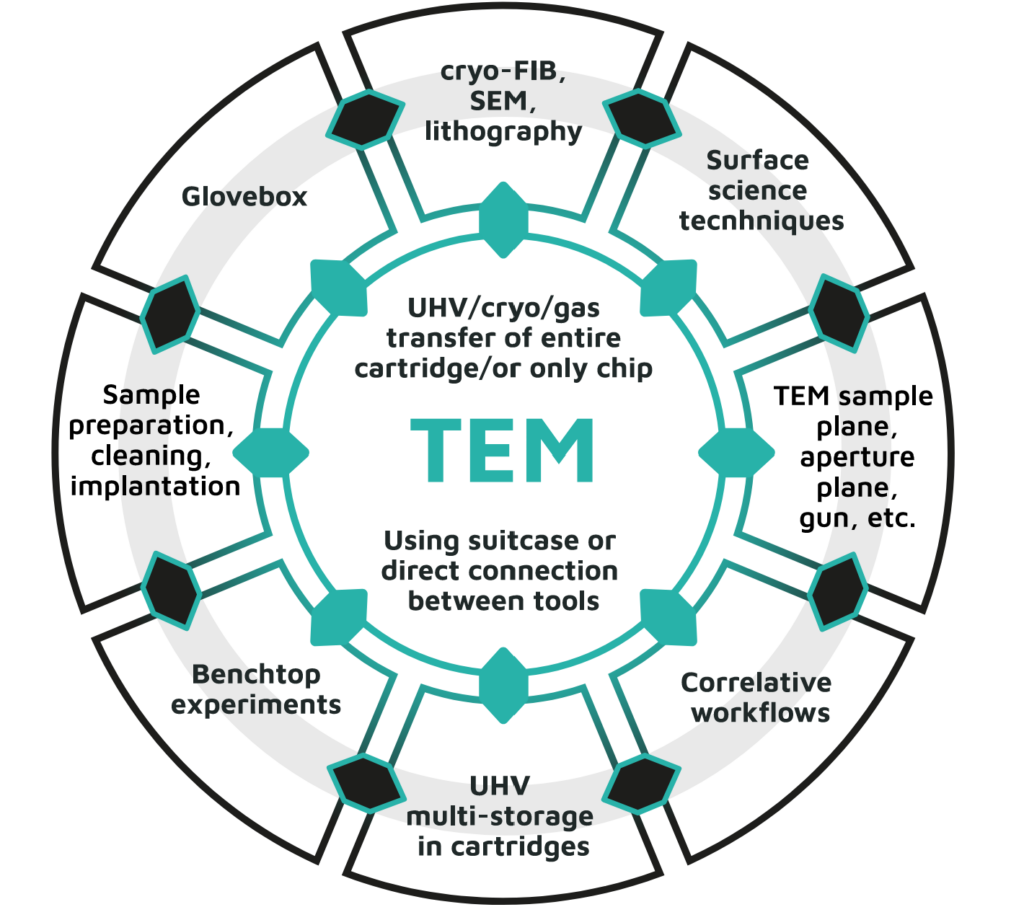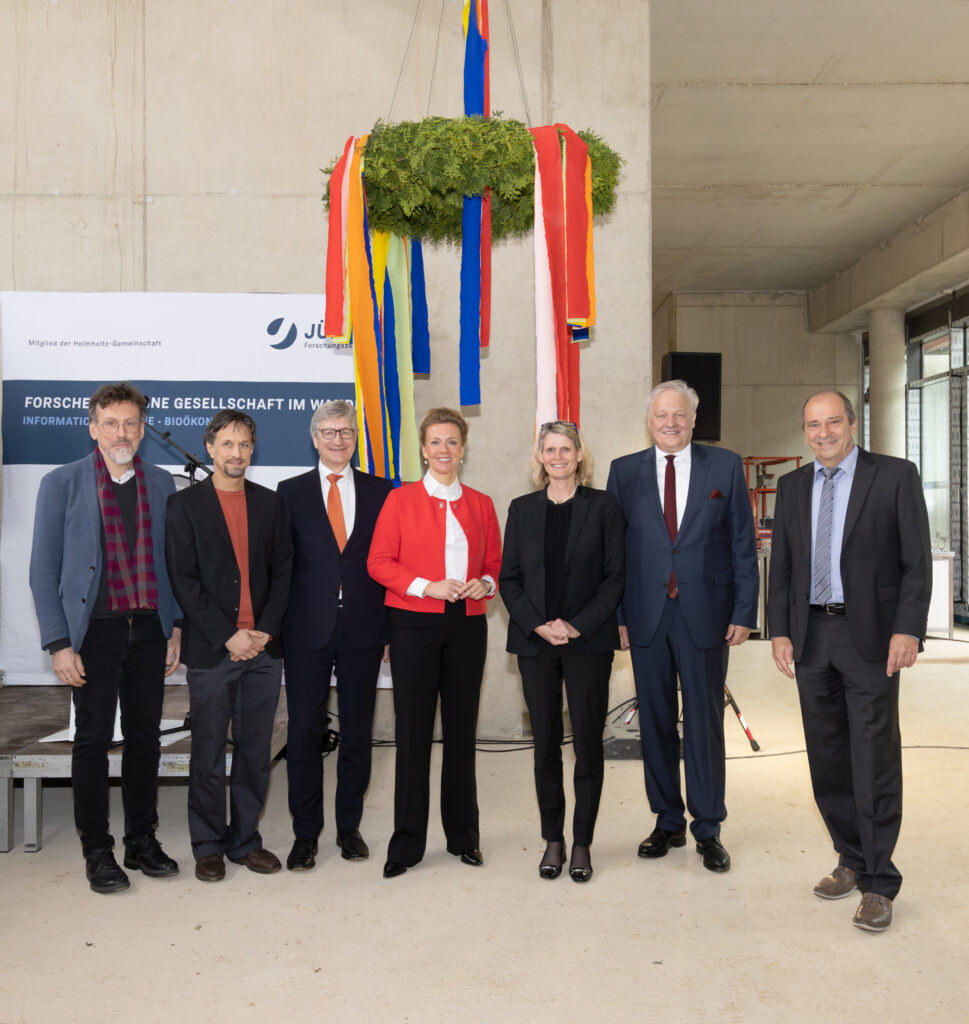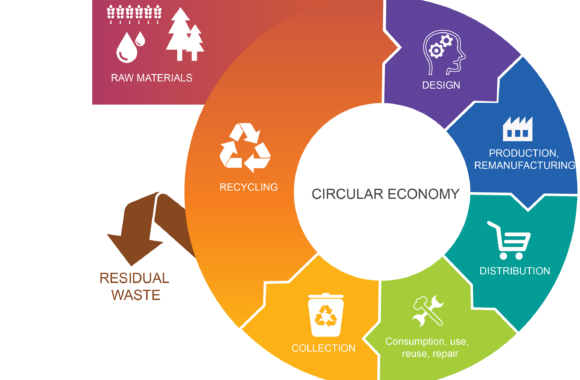

IMPRESS stands for Interoperable electron Microscopy Platform for advanced RESearch and Services. Our goal is to design and deliver TEM instrumentation conceived at the highest level of open standards and interoperability.
The architecture of this innovative platform will be based on interchangeable components that can be readily customized by scientists and further adjusted, taking into account the needs of users from different scientific communities.
We aim to make TEMs flexible so they can be adapted to a diversity of multimodal experiments, instead of adapting experiments to TEMs.
The IMPRESS project aims to establish the first open knowledge and innovation hub for TEM: FAIRcube. The hub will manage and share scientific, technological, and operational data in an accessible repository based on FAIR principles and aligned with the European Open Science Cloud (EOSC) ecosystem.
FAIRcube will provide a dynamic space to access and exchange information, enabling collaboration between developers, experienced researchers, and newcomers. The FAIRcube approach will drive research and innovation, providing a foundation for IMPRESS to incorporate ideas from scientific communities outside the consortium.
Website
After the 2020 Kavli Prize in Nanoscience was awarded to Knut Urban, Harald Rose, Max Haider and Ondrej Krivanek for sub-ångström resolution imaging and chemical analysis using electron beams, the BBC produced a new series called “Secrets of Size”. In the episode “Going Small” the history of ER-C was featured.
Read more about the Kavli Prize

From left to right: Prof. Rafal Dunin-Borkowski, Prof. Carsten Sachse (beide Direktoren ER-C), der Jülicher Vorstandsvorsitzende Prof. Wolfgang Marquardt, Ina Brandes, Ministerin für Kultur und Wissenschaft NRW, Judith Pirscher, Staatssekretärin im Bundesministerium für Bildung und Forschung, Landrat Wolfgang Spelthahn und Prof. Joachim Mayer (Direktor ER-C)
In the presence of State Secretary Judith Pirscher from the Federal Ministry of Education and Research and Ina Brandes, Minister for Culture and Science of the State of North Rhine-Westphalia, Forschungszentrum Jülich celebrated the topping-out ceremony for the new ER-C building as a milestone on the way to a pioneering new research infrastructure.
The high-resolution electron microscopes of the Ernst Ruska Centre at Forschungszentrum Jülich already provide precise insights into atomic structures and will be further expanded in the “ER-C 2.0” project. The consistent further development and expansion of electron-optical methods and instruments corresponds to the increasing demand for atomic-resolution characterisation that exists today in many fields of knowledge. At the same time, ER-C 2.0 is intended to contribute to securing Germany’s leading position in these fields in the long term.
To this end, a building costing around 23 million euros is being constructed on the Jülich campus for six new high-performance electron microscopes with very special requirements. For example, the foundation, which is partially 150 cm thick and decoupled from the surroundings, ensures that even the smallest vibrations, for example from passing trucks, are avoided in order not to falsify the measurement results. With an area of almost 10,000 square metres, the ER-C 2.0 will be more than twice as large as the previous building. The new instruments with very different specifications aim at the highest possible spectroscopic, temporal and spatial resolution in combination with correlative investigation possibilities. With the combination of instruments and correlative techniques, ER-C 2.0 will offer new possibilities for the characterisation of soft and biological materials, in addition to further developments of ER-C’s existing focus on inorganic materials.
Comments on the topping-out ceremony
Judith Pirscher, State Secretary at the Federal Ministry of Education and Research (BMBF) (translated):
“From the in-depth into the smallest details, we expect great discoveries in materials research and beyond. The ER-C 2.0 implements a project of the National Roadmap for Research Infrastructures that the German Science Council has rated as outstanding. The Federal Government is therefore providing funding of around 100 million euros for the building and in particular for the six high-performance electron microscopes.”
Ina Brandes, Minister for Culture and Science of North Rhine-Westphalia (translated):
“The smallest details can be the trigger for the greatest innovations! Materials research in Jülich will help us meet the challenges of our time. I am sure that the development of new medicines, smart chips and powerful batteries can make people’s lives better. Thus, at Forschungszentrum Jülich, a look into the microscope becomes a look into the future. Especially the business and science location in the Rhenish Revier will benefit from this project.”
Prof. Wolfgang Marquardt, Chairman of the Board of Directors of Forschungszentrum Jülich (translated):
“With the research infrastructure of ER-C 2.0, a globally visible lighthouse is being created that is of interest to science and industry. It will become a real locational advantage for the Rhenish mining area in its bid to attract innovative companies of the most diverse orientation. Because new material innovations are the basis of new value creation.”

Venue
Ernst Ruska-Centre for Microscopy and Spectroscopy with Electrons (ER-C), FZ Juelich, Germany
Summary
The Joint Lab Model and Data Driven Materials Characterization conducted its first in-person workshop from 8th-10th March 2023, bringing together researchers within the Helmholtz Research Field Information from Forschungszentrum Jülich, Karlsruhe Institute of Technology and Helmholtz-Zentrum Hereon. The 3-day workshop took place at Forschungszentrum Jülich and in particular gave young researchers the opportunity to present their cutting-edge research in the field of materials characterization.
Read more on the Helmholts Blog.

Venue
Ernst Ruska-Centre for Microscopy and Spectroscopy with Electrons (ER-C), FZ Juelich, Germany
and Online (BlueJeans)
Summary
After a long Corona break the FZJ day open finally became possible again in summer 2022. More than 60 institutes organized over 300 presentations to show what we do to about 20.000 people who visited the research centre that day. A highlight was the VIP tour where a few chosen institutes had the chance to present their work to high-profile politicians like our new NRW minister for culture and science, Ina Brandes. It was a wonderful day full of lively discussions and we want to thank everyone who was involved and made this event such a success.
The planned expansion of the ER-C 2.0 will create an infrastructure that can initiate and support the accelerated and sustainable development of new materials as well as innovations and solutions to global challenges, especially in the local environment. As well as strengthening the current focus on hard matter and materials physics, research in the field of soft matter and life sciences will be consistently expanded. Open access to innovative instruments at a central location, the broad interdisciplinary range of applications and close cooperation with leading international instrument manufacturers offer a unique global positioning.
The European Union’s Circular Economy Action Plan is based on the assumption that up to 80 percent of a product’s environmental impact is determined during the design phase. In order to foster a comprehensive approach to sustainable production and products, the European research infrastructure project ReMade@ARI is about to be launched: it commits to leverage the development of innovative, sustainable materials for key components in the most diverse sectors, such as electronics, batteries, vehicles, construction, packaging, plastics, textiles and food on an unprecedented level. In order to meet the challenge of designing new materials that are both competitively functional and highly recyclable, the potential of more than 50 analytical research infrastructures of the European ARIE network (https://arie-eu.org/) will be harnessed. The Ernst Ruska-Centre for Microscopy and Spectroscopy with Electrons in Forschungszentrum Jülich will coordinate the contribution to the project from the European Distributed Research Infrastructure for Advanced Electron Microscopy (https://e-dream-eu.org/). ReMade@ARI will start on September 1, 2022 under the leadership of the Helmholtz-Zentrum Dresden-Rossendorf (HZDR).

An illustrative example: In the supermarket, fruits and vegetables are often packaged in plastics to extend their shelf life. In the future, bio-based materials derived from wood could provide a sustainable alternative. This is where ReMade@ARI comes into play: research leading to the development of sophisticated new materials crucially relies on access to the world-class European research infrastructures, which have joined forces in ReMade@ARI. The ReMade@ARI platform will be the central hub for all sectors and research areas in which new materials for a circular economy will be developed. “We provide scientists who are working on the design of new recyclable materials with analytical tools that enable them to explore the properties and the structure of their material in the smallest details up to atomic resolution. This requires the exploitation of the most diverse analytical methods, involving appropriate combinations of photons, electrons, neutrons, ions, positrons and the highest magnetic fields,” says Dr. Stefan Facsko, the project’s scientific coordinator. “Any scientist in academic or industrial research working on new recyclable materials should get in touch with us.” A particular focus will be on scientists in research fields in which, up to now, the potential of research infrastructures has not yet been exploited. “We will offer them an all-round service, closely collaborating with them to identify the relevant properties to be analyzed, in order to develop the optimum material for a particular purpose. Based on that, the most suitable research infrastructures to measure these properties will be identified from among the pool of Europe’s unique facilities”. ReMade@ARI will have a significant impact on the advancement of the circular economy. Overall, 40 partners of the ARIE network are involved in the project. The Ernst Ruska-Centre for Microscopy and Spectroscopy with Electrons contributes with access to its unique electron microscopes. This concerns the entire chain from sample preparation to evaluation and interpretation of data. The project is being funded by the European Union with a budget of 13.8 million euros. The project coordinator is HZDR. Dr. Barbara Schramm, European Union Liaison Officer at HZDR, explains: “With a pool of highly motivated young researchers, the project will offer a user service of unprecedented quality, which will enable each promising idea to be brought to success. We encourage in particular researchers from industry, for which we have put together an extensive package of support measures tailor-made to industry needs, to get in touch with us.”
Website
Additional information
Dr. Stefan Facsko I Head Ion Beam Center at HZDR
Phone: +49 351 260 2987 I Email: s.facsko@hzdr.de Dr. Barbara Schramm I Head Research Programs and International Projects at HZDR
Phone: +49 351 260 2684 I Email: b.schramm@hzdr.de
Media contact:
Simon Schmitt | Head Communications and Media Relations at HZDR
Phone: +49 351 260 3400 | Email: s.schmitt@hzdr.de
Contact in Forschungszentrum Jülich:
Prof. Dr. Rafal E. Dunin-Borkowski | Head Ernst Ruska-Centre for Microscopy and Spectroscopy with Electrons
Phone: +49 2461 61 9297 | Email: r.dunin-borkowski@fz-juelich.de
